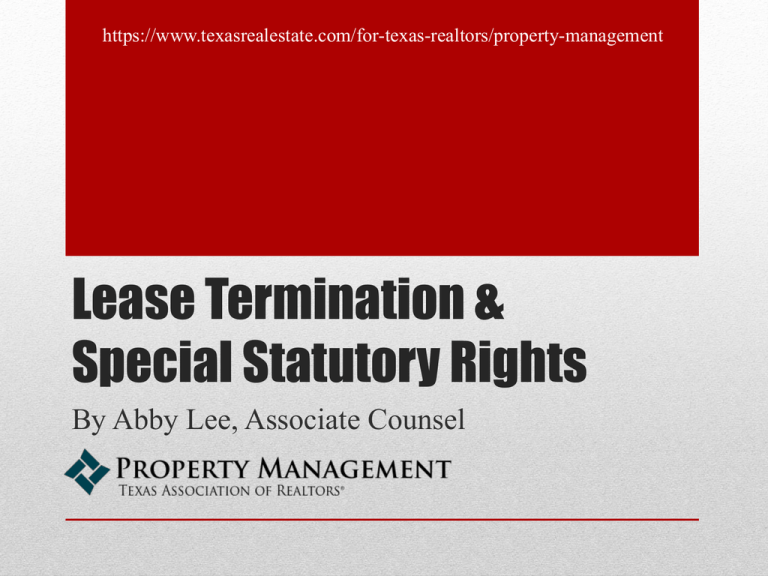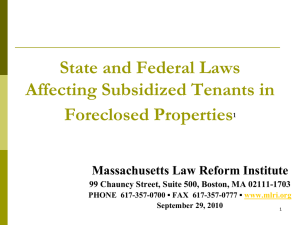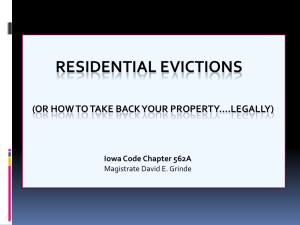
https://www.texasrealestate.com/for-texas-realtors/property-management
Lease Termination &
Special Statutory Rights
By Abby Lee, Associate Counsel
I.
Methods of Termination
A.
B.
Expiration
Agreement
i.
ii.
C.
D.
Mutual Termination Agreement
Replacement Tenant/Subtenant
Breach
By Operation of Law
II. Special Statutory Rights
A. Family Violence
B. Sexual Offenses & Stalking
C. Military Entrance, Deployment, or Transfer
III. Questions
Lease Termination &
Special Statutory Rights
• A lease, just like any contract, can terminate a variety of
ways. The TAR Residential Lease (TAR form 2001) is no
different.
• The TAR lease can terminate:
1. Upon expiration of the primary term or month-to-month
term after proper notice has been provided;
2. By agreement of both the landlord and tenant;
3. By a breach of one the parties; or
4. By operation of law.
Methods of Termination
Upon expiration of the primary or month-to-month term after
proper notice has been provided…
Paragraph 4 of the TAR Residential Lease provides the requirements
for proper termination upon the expiration of the primary or month-tomonth term of the lease.
Methods of Termination
What’s the difference between Paragraphs 4A and 4B in the Texas Association of
REALTORS® Residential Lease (TAR 2001)?
Paragraph 4A applies to the initial term of the lease. Paragraph 4B applies if the
lease is on a month-to-month basis.
For example, a tenant has a one-year lease in which the expiration date of the
initial term is Jan. 31. Paragraph 4A(2) is checked, which requires a 60-day
notice of termination before the expiration date. If the landlord or tenant doesn’t
provide the necessary written notice of termination on or before Dec. 3, a time
period of 60 days, the lease will automatically renew on a month-to-month basis.
Paragraph 4B will now apply for notice of termination. The period for giving
notice now will depend on whether 4B(1) or 4B(2) is checked.
Both paragraphs require written notice of termination, not verbal notice. If the
landlord does not intend to renew, he should provide the Notice of Landlord’s
Intent Not to Renew (TAR 2217) within the necessary time frame required under
the lease.
Frequently Asked Questions
A tenant and landlord executed a TAR Residential Lease (TAR 2001).
In Paragraph 4A, Box 2 was checked requiring either party to give
60 days' notice to terminate the lease. In Paragraph 4B, Box 2 was
checked requiring at least 30 days’ notice if the lease renewed on a
month-to-month basis. The lease automatically renewed on a monthto-month basis because neither party provided 60 days’ notice of
termination as required by Paragraph 4A. The tenant now wants to
terminate the lease, but the landlord is requiring the tenant to give
60 days' notice to terminate. Can the landlord require the tenant to
give 60 days' notice now that the lease is on a month-to-month
basis?
No. Under Paragraph 4B(2), the tenant is only required to
provide 30 days’ notice.
Frequently Asked Questions
I am working with a tenant whose lease ends August 31st. The
landlord and tenant agreed to check boxes 4(A)(1) & 4(B)(1).
The tenant didn’t provide the landlord written notice of
termination to terminate the lease on August 31st until August
15th. Will the tenant’s lease obligations end on August 31st ?
No. If the tenant failed to provide the landlord timely
written notice as required by paragraph 4(A)(1) (e.g.
provide written notice not less than 30 days before the
expiration date), the lease will automatically renew on a
month-to-month basis. The tenant must then provide a
subsequent written notice of termination as required by
4(B)(1).
Frequently Asked Questions
I manage the property with multiple tenants. One of the
tenants provided timely written notice of termination.
However, one of the tenants wants to stay and is arguing that
the notice of termination doesn’t apply to him. Is that correct?
No. Paragraph 33C of the TAR Residential Lease states
that all tenants are “jointly and severally liable for all
provisions of the lease. Any act or notice to, refund to, or
signature of, any one or more of the Tenants regarding any
term of this lease, its extension, its renewal, or its
termination is binding on all Tenants executing this lease.”
Therefore, a notice of termination provided by one tenant
would serve as a notice of termination for all tenants. If the
tenant wishes to remain, he can sign a new lease with the
landlord, provided the landlord agrees.
Frequently Asked Questions
Upon expiration of the primary or month-to-month term after
proper notice has been provided…
• The landlord can use the Notice of Landlord’s
Intent Not to Renew (TAR form 2217) to provide
notice to the tenant.
• The tenant can use the Notice of Tenant’s Intent to
Vacate (TAR form 2218) to provide notice to the
landlord.
Methods of Termination
• Notice of Landlord’s Intent Not to Renew (TAR
form 2217)
Methods of Termination
• Notice of Tenant’s Intent to Vacate (TAR form
2218)
Methods of Termination
Upon expiration of the primary or month-to-month term after proper
notice has been provided…
• If not using a lease, like the TAR Residential Lease, that
specifies a period of notice required to terminate the tenancy,
or alternatively states that no notice is required, Texas Property
Code § 91.001 will apply to a month-to-month lease.
• Note: Texas Property Code § 91.001 does not apply if the
parties simply fail to check a box in either Paragraph 4A or 4B
of the TAR Residential Lease. The TAR lease provides that, in
that scenario, Paragraph 4A(1) or 4B(1) will apply
respectively.
Methods of Termination
PROPERTY CODE
TITLE 8. LANDLORD AND TENANT
CHAPTER 91. PROVISIONS GENERALLY APPLICABLE TO LANDLORDS AND TENANTS
Sec. 91.001. NOTICE FOR TERMINATING CERTAIN TENANCIES.
(a) A monthly tenancy or a tenancy from month to month may be terminated by the tenant or the
landlord giving notice of termination to the other.
(b) If a notice of termination is given under Subsection (a) and if the rent-paying period is
at least one month, the tenancy terminates on whichever of the following days is the later:
(1) the day given in the notice for termination; or
(2) one month after the day on which the notice is given.
(c) If a notice of termination is given under Subsection (a) and if the rent-paying period is
less than a month, the tenancy terminates on whichever of the following days is the later:
(1) the day given in the notice for termination; or
(2) the day following the expiration of the period beginning on the day on which notice
is given and extending for a number of days equal to the number of days in the rentpaying period.
(d) If a tenancy terminates on a day that does not correspond to the beginning or end of a
rent-paying period, the tenant is liable for rent only up to the date of termination.
(e) Subsections (a), (b), (c), and (d) do not apply if:
(1) a landlord and a tenant have agreed in an instrument signed by both parties on a
different period of notice to terminate the tenancy or that no notice is required; or
(2) there is a breach of contract recognized by law.
Methods of Termination
An owner just hired me as the new property manager. In looking over
the TAR Residential Lease that the parties signed, I notice that box 1
in Paragraph 4(A) is checked, but no box is checked in Paragraph
4(B). The tenant’s lease is now in month-to-month and the landlord
wants to terminate. How much notice does she have to provide to the
tenant?
If using the TAR Residential Lease, note the sentence in Paragraph
4: “IF a box is not checked under Paragraph 4A, Paragraph 4A(1)
will apply. If a box is not checked under Paragraph 4B, Paragraph
4B(1) will apply.” Therefore, the landlord will need to provide the
tenant a written notice of termination that will become effective “on
the last day of the month following the month in which the notice is
given. Landlord is not obligated to prorate rent even if Tenant
surrenders the Property before the termination date.”
Frequently Asked Questions
• The TAR lease can terminate:
1. Upon expiration of the primary term or month-to-month
term after proper notice has been provided;
2. By agreement of both the landlord and tenant;
3. By a breach of one the parties; or
4. By operation of law.
Methods of Termination
By agreement of both the landlord and tenant…
• A landlord and tenant may agree to terminate the lease
at any time.
• If both parties agree to terminate the lease, this should
be reduced to writing and signed by both parties.
• Use the Early Termination of Residential Lease (TAR
form 2012).
OR
• Alternatively, the landlord and tenant could work to
find a replacement tenant.
Methods of Termination
By agreement of both the landlord and tenant…
•
Paragraph 28(B) provides details on the process of assigning, subletting, or
replacing a tenant, should the landlord agree.
Methods of Termination
True or False. A landlord wishing to move back
into their property has a right to break the lease
at any time before it expires.
False. Since the lease is a legally binding
contract, a landlord cannot force a tenant to
vacate the premises prior to the end of the lease.
Frequently Asked Questions
• The TAR lease can terminate:
1. Upon expiration of the primary term or month-to-month
term after proper notice has been provided;
2. By agreement of both the landlord and tenant;
3. By a breach of one the parties; or
4. By operation of law.
Methods of Termination
By a breach of one the parties**…
Methods of Termination
By a breach of one of the parties**…
If a landlord breaches the lease, a tenant may be entitled to a variety
of remedies.
•
For example:
Sec. 91.004. LANDLORD'S BREACH OF LEASE; LIEN.
(a) If the landlord of a tenant who is not in default
under a lease fails to comply in any respect with the
lease agreement, the landlord is liable to the tenant for
damages resulting from the failure.
(b) To secure payment of the damages, the tenant has a
lien on the landlord's nonexempt property in the tenant's
possession and on the rent due to the landlord under the
lease.
Methods of Termination
By a breach of one the parties**…
If the tenant breaches the lease, the TAR Residential Lease
provides for a variety of remedies as well.
Methods of Termination
True or False. A landlord has a duty to mitigate damages
by reletting the premises if the tenant breaches the lease
by moving out early without legal cause.
True. Texas Property Code § 91.006 states that a landlord
has a duty to mitigate damages if a tenant abandons the
leased premises. Additionally, Paragraph 27D of the TAR
Residential Lease states that “Landlord will attempt to
mitigate any damage or loss caused by Tenant’s breach
by attempting to relet the Property to acceptable tenants
and reducing Tenant’s liability accordingly.
Frequently Asked Questions
• The TAR lease can terminate:
1. Upon expiration of the primary term or month-to-month
term after proper notice has been provided;
2. By agreement of both the landlord and tenant;
3. By a breach of one the parties; or
4. By operation of law.
Methods of Termination
By operation of law…
• Both Federal and state laws may grant tenants
special rights of early termination in limited
circumstances…
Methods of Termination
Tenants may have special statutory rights to
terminate a lease early in certain situations
involving:
• Family Violence
• Sex Offenses or Stalking
• Military Entrance, Deployment or Transfer
Special Statutory Rights
Tenants may have special statutory rights to
terminate a lease early in certain situations
involving:
• Family Violence
• Sex Offenses or Stalking
• Military Entrance, Deployment or Transfer
Special Statutory Rights
• Texas Property Code § 92.016 governs rights or duties
of landlords and tenants with regard to family violence.
• Paragraph 28A(2) of the TAR Residential Lease:
Special Statutory Rights:
Family Violence
• A tenant may terminate a lease and avoid liability for
future rent and any other sums if the tenant is a victim
of family violence.
•
“Family violence” is defined as:
1.
An act by a member of a family or household against another
member of the family or household that is intended to result in
physical harm, bodily injury, assault, or sexual assault or that is a
threat that reasonably places the member in fear of imminent
physical harm, bodily injury, assault, or sexual assault, but does not
include defensive measures to protect oneself;
2.
Abuse by a member of a family or household toward a child of the
family or household; or
3.
Dating violence.
Special Statutory Rights:
Family Violence
• A tenant may exercise the rights to terminate the lease, vacate the dwelling
before the end of the lease term, and avoid liability beginning on the date
after all of the following events have occurred:
1. A judge signs one of the following orders: a temporary injunction, a temporary
ex parte order, or a protective order (see TPC 92.016(b));*
2. The tenant provides a copy of the relevant documentation (above) to the
landlord or landlord’s agent;
3. The tenant provides written notice of termination of the lease to the landlord on
or before the 30th day before the date the lease terminates;
4. The 30th day after the date the tenant provided notice under Subdivision (3)
expires; and
5. The tenant vacates the dwelling.
•
•
The protective order may protect the tenant or an occupant from family violence.
"Occupant" means a person who has the landlord's consent to occupy a dwelling but
has no obligation to pay the rent for the dwelling.
Special Statutory Rights:
Family Violence
• If the family violence is committed by a cotenant or occupant of the
dwelling, a tenant may exercise the rights to terminate the lease, vacate the
dwelling before the end of the lease term, and avoid liability beginning on
the date after all of the following events have occurred:
1. A judge signs one of the following orders: a temporary injunction or a
protective order (not the ex parte order);*
2. The tenant provides a copy of the relevant documentation (above) to the
landlord or landlord’s agent; and
3. The tenant vacates the dwelling.
*The protective order may protect the tenant or an occupant from family violence.
"Occupant" means a person who has the landlord's consent to occupy a dwelling but has
no obligation to pay the rent for the dwelling.
Special Statutory Rights:
Family Violence
• This does not affect a tenant's liability for delinquent, unpaid rent or other
sums owed to the landlord before the lease was terminated by the tenant,
unless the lease does not contain language substantially equivalent to the
following: "Tenants may have special statutory rights to terminate the lease
early in certain situations involving family violence or a military
deployment or transfer.”
• The TAR Residential Lease contains such language in Paragraph 28A.
Paragraph 28A(2) specifically discusses family violence.
• A landlord who violates this section is liable to the tenant for actual
damages, a civil penalty equal in amount to the amount of one month's rent
plus $500, and attorney's fees.
Special Statutory Rights:
Family Violence
Tenants may have special statutory rights to
terminate a lease early in certain situations
involving:
• Family Violence
• Sex Offenses or Stalking
• Military Entrance, Deployment or Transfer
Special Statutory Rights
• Texas Property Code § 92.0161 governs the rights and
duties of the parties.
• Paragraph 28A(3) in the TAR Residential Lease:
Special Statutory Rights:
Sexual Offenses & Stalking
• A tenant may terminate the lease and avoid liability for
future rent and any other sums due under the lease for
terminating, if the tenant is a:
1. Victim of certain sexual offenses or stalking, or
2. Parent or guardian of a victim of certain sexual offenses
or stalking.
*A tenant who is a parent or guardian of a victim must reside with
the victim to exercise these rights.
Special Statutory Rights:
Sexual Offenses & Stalking
• If the tenant is a victim or a parent or guardian of a victim
of:
•
•
•
•
•
•
sexual assault,
aggravated sexual assault,
indecency with a child,
sexual performance by a child,
continuous sexual abuse of a child, or
an attempt to commit any of the foregoing offenses,
that takes place during the preceding six-month period on
the premises or at any dwelling on the premises, the tenant
must provide to the landlord or the landlord's agent a copy
of…
Special Statutory Rights:
Sexual Offenses & Stalking
1.
Documentation of the assault or abuse, or attempted assault or abuse,
of the victim from a licensed health care services provider who
examined the victim;
2.
Documentation of the assault or abuse, or attempted assault or
abuse, of the victim from a licensed mental health services
provider who examined or evaluated the victim;
Documentation of the assault or abuse, or attempted assault or
abuse, of the victim from an individual authorized under
Chapter 420, Government Code, who provided services to
the victim; or
Documentation of a protective order issued under Chapter
7A, Code of Criminal Procedure, except for a temporary ex
parte order.
3.
4.
Special Statutory Rights:
Sexual Offenses & Stalking
• If the tenant is a victim or a parent or guardian of a victim
of stalking, that takes place during the preceding six-month
period on the premises or at any dwelling on the premises,
the tenant must provide to the landlord or the landlord's agent
a copy of:
1.
2.
Documentation of a protective order issued under Chapter 7A or
Article 6.09, Code of Criminal Procedure, except for a temporary ex
parte order; or
Documentation of the stalking from a provider of services described
in previous slide (See Sexual Offenses slide, item 1-3) and:
a.
b.
A law enforcement incident report; or
If a law enforcement incident report is unavailable, another record
maintained in the ordinary course of business by a law enforcement
agency.
Special Statutory Rights:
Sexual Offenses & Stalking
• For both scenarios, a tenant may exercise the rights to
terminate the lease, vacate the dwelling before the end of the
lease term, and avoid liability beginning on the date after all
of the following events have occurred:
1.
2.
3.
4.
The tenant provides a copy of the relevant documentation
described by previous slides to the landlord or landlord’s agent;
The tenant provides written notice of termination of the lease to
the landlord on or before the 30th day before the date the lease
terminates;
The 30th day after the date the tenant provided notice under
Subdivision (2) expires; and
The tenant vacates the dwelling.
Special Statutory Rights:
Sexual Offenses & Stalking
• This does not affect a tenant's liability for delinquent, unpaid rent or
other sums owed to the landlord before the lease was terminated by the
tenant, UNLESS the lease fails to contain language substantially
equivalent to the following: "Tenants may have special statutory rights to
terminate the lease early in certain situations involving certain sexual
offenses or stalking.”
•
The TAR Residential Lease contains the necessary language.
• A landlord who violates this section is liable to the tenant for actual
damages, a civil penalty equal to the amount of one month's rent plus $500,
and attorney's fees.
• A person who receives information under this section (this includes the
landlord and landlord’s agent) may not disclose the information to any
other person except for a legitimate or customary business purpose or as
otherwise required by law.
Special Statutory Rights:
Sexual Offenses & Stalking
Tenants may have special statutory rights to
terminate a lease early in certain situations
involving:
• Family Violence
• Sex Offenses or Stalking
• Military Entrance, Deployment or Transfer
Special Statutory Rights
• The federal Servicemembers Civil Relief Act (SCRA),
gives servicemembers special statutory rights to
terminate a lease early in certain circumstances.
• In Texas, Texas Property Code § 92.017 also governs the
rights and duties of the parties.
• Paragraph 28A(1) of the TAR Residential Lease:
Special Statutory Rights: Military
Entrance, Transfer, or Deployment
• A tenant who is a:
• Servicemember, or
• A dependent of a servicemember
may be able to vacate the dwelling leased by the tenant
and avoid liability for future rent and all other sums due
under the lease for terminating the lease and vacating the
dwelling before the end of the lease term.
• “Servicemember” includes members of the Army, Navy, Air Force,
Marine Corps, and Coast Guard, as well as the commissioned corps
of the Public Health Service or the National Oceanic and
Atmospheric Administration (NOAA).
• “Dependent” includes the servicemember’s spouse, child, or an
individual for whom the servicemember provided more than onehalf of the individual’s support for 180 days.
Special Statutory Rights: Military
Entrance, Transfer, or Deployment
• A tenant may terminate the lease at any time after:
1. The tenant’s entrance into military service; or
2. The date of the military orders for a:
a. For a permanent change of station; or
b. To deploy with a military unit or as an individual in
support of a military operation for a period of not less
than 90 days.
• The lease must be either:
1. Executed by or on behalf of a person who thereafter and
during the term of the lease enters military service; or
2. Executed by the servicemember, while in military service, who
thereafter receives military orders for a permanent change of
station or to deploy as specified above.
Special Statutory Rights: Military
Entrance, Transfer, or Deployment
• Termination is made by delivering written notice of
termination, along with a copy of the military orders to
the landlord or landlord’s agents.
• Notice is effective 30 days after the first date the next
rental payment is due after the notice is delivered, if
rent-paying period is one month. If rent-paying period is
not one month, termination will be effective on the last
day of the month following the month in which the
notice is delivered.
• Example: Notice is given September 15. Rent is due on the 1st of
each month. Notice is therefore effective October 31st.
Special Statutory Rights: Military
Entrance, Transfer, or Deployment
• Rent amounts that are unpaid for the period prior to the effective date of the
termination will be paid on a prorated basis. Any amounts paid in advance
for a period after the termination date will be refunded within 30 days of
the effective date.
• The landlord may not impose an early termination charge, but this does not
affect a tenant's liability for delinquent, unpaid rent or other sums owed to
the landlord before the lease was terminated by the tenant, except as
provided below:
• A tenant who terminates a lease is released from all liability for any
delinquent, unpaid rent owed to the landlord by the tenant on the effective
date of the lease termination if the lease does not contain language
substantially equivalent to the following: "Tenants may have special
statutory rights to terminate the lease early in certain situations involving
family violence or a military deployment or transfer.“
• The TAR Residential Lease contains the necessary language.
• A landlord who violates this section is liable to the tenant for actual
damages, a civil penalty in an amount equal to the amount of one month's
rent plus $500, and attorney's fees.
Special Statutory Rights: Military
Entrance, Transfer, or Deployment
• A tenant and a landlord may agree that the tenant waives a tenant's
rights if the tenant, or any dependent living with the tenant, moves
into base housing or other housing within 30 miles of the dwelling.
• A waiver under this section must be signed and in writing in a
document separate from the lease and must comply with federal
law. A waiver does not apply if:
1.
2.
The tenant or the tenant's dependent moves into housing owned or
occupied by family or relatives of the tenant or the tenant's
dependent; or
The tenant and the tenant's dependent move, wholly or partly, because
of a significant financial loss of income caused by the tenant's
military service.
Special Statutory Rights: Military
Entrance, Transfer, or Deployment
Questions
• Thanks for your participation in our webinar!
• Future Webinar Dates: December 17.
• Questions? Contact the Legal Hotline at 512-480-8200
• Give us your feedback! Complete the survey in the
follow-up email
Lease Termination &
Special Statutory Rights
















